Simply Greek – Cultures and Traditions of Civilization’s Birthplace
When you think of Greece, what comes to mind? The rise of democracy? The Olympic Games, ancient history and philosophy, Minotaurs and mythology? Perhaps you think of magnificent temples, the clear waters of the Aegean Sea, sandy beaches, mountain villages, or small windy roads blocked by sheep and goats. Greece is also known as the birthplace of Western civilization. As a Global Volunteer, you have the opportunity to learn more about the people and culture of this fascinating country which gave rise to much of the world’s daily life.
Filotimo: the Greek word that has no translation.
Even the Greeks themselves have trouble agreeing on a single definition of this word. Filotimo describes a complex array of values, all held dearly in Greek culture, and can’t be accurately translated into English. It’s a core value that Greeks live by, which makes them “stand out” from the rest of the world as far as culture and hospitality go. Filotimo encompasses dignity, pride, and honor as well as the ideal actions and behaviors, hospitality, trust, and bonds between each other. When children display unconditional love and respect towards others, they are said to be displaying filotimo. It extends to include appreciation and admiration for ancestors and heritage.
Greek Weddings: the ultimate gathering of family.
Greeks, as a culture, are extremely family-orientated. Everything revolves around the family. Everyone is seen to be related to everyone else, and so celebrations such as weddings and baptisms can result in a guest list of over 1,000 people! When you’re invited to a wedding, your immediate family is invited, too — children included. A typical wedding ceremony begins between 6 and 8 p.m. with a religious service conducted by a Greek Orthodox priest followed by the Greek glenti (party) with live music and an abundance of Greek specialties such as lamb, pork, spaghetti, rice, tzatziki, salads, and wine. Everybody dances, from the oldest grandpa or grandma, right down to the youngest, who can barely walk. It seems Greeks were born with a passion for dancing. Don’t be surprised to see the priest on the dance floor, too!
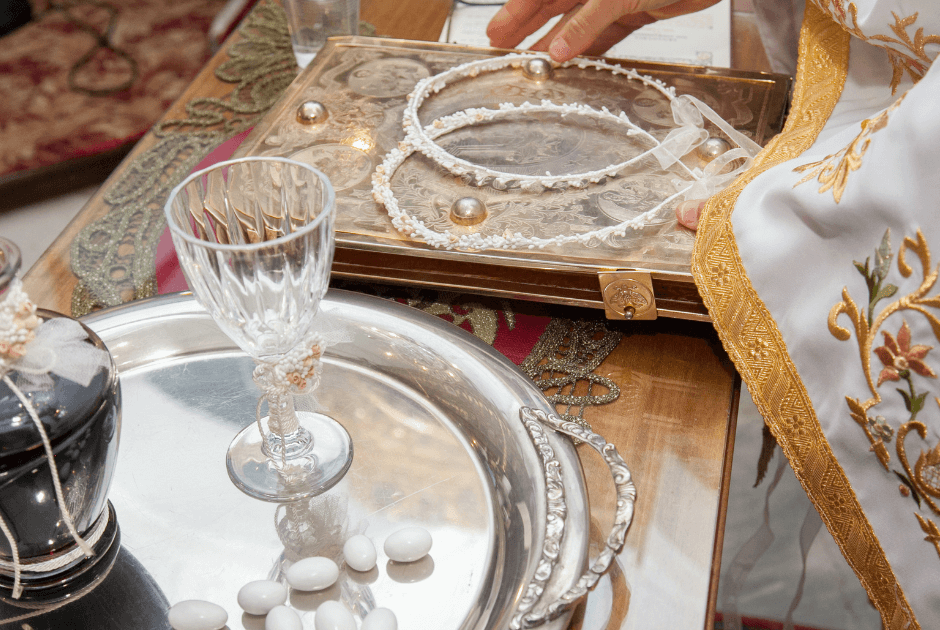
Greek Baptisms: the christening of a new life.
One of the most important religious ceremonies in the Greek Orthodox Church is baptism, the day a child officially becomes a Christian. Greek children are baptized between the ages of 18 months and three years. Parents choose godparents who are usually good friends or, on occasion, family members. Godparents are responsible for purchasing the items used by the priest during the ceremony: a white towel, soap, candles, olive oil, scissors, a set of new clothing, a hat, shoes, and a gold cross and chain. The toddlers are submerged completely in the font three times and signed with a cross on the forehead with holy water. After the child has been dried and then clothed in their new garments including the cross and chain, everyone gathers for the baptismal celebration, which includes live music, food, dancing, and wine. Guests receive martyrika (small crosses attached to ribbon and pinned to the guests’ clothes) as well as koufeta (candy-coated almonds) to thank them for being part of the family’s special day. If you’re a guest at baptism, it’s tradition to give money, baby-related gifts like clothes and toys, or religious gifts such as icons and crosses.
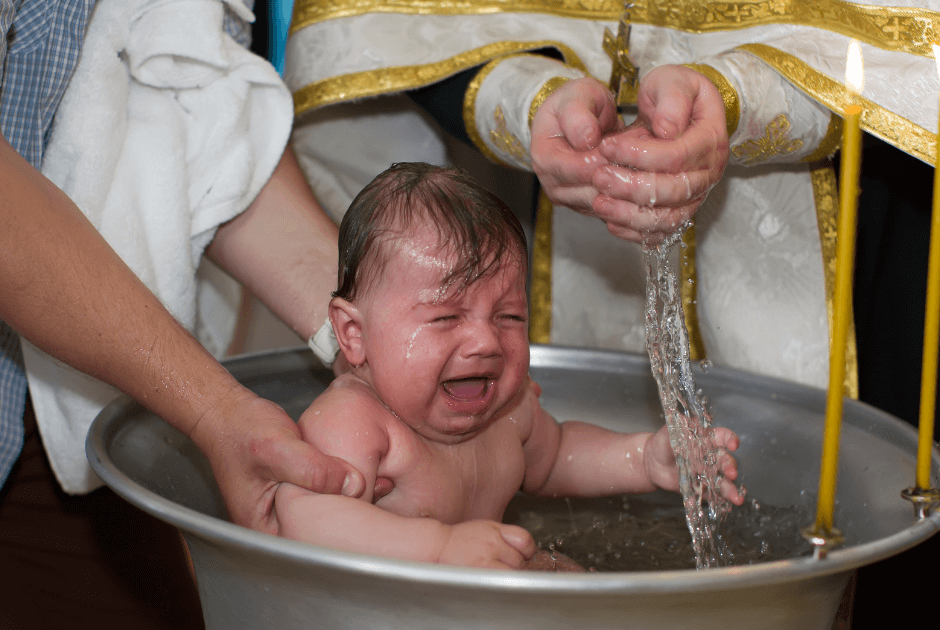
Name Days: celebrating ancestry.
Name day celebrations are more common than birthdays in Greece. Throughout the year, the Greek Orthodox Church dedicates certain days of the year to celebrate its saints or martyrs. Most Greeks are named after a saint or martyr, so, on the designated saint’s day, if you’re named after that same saint, you’ll celebrate that day, inviting family and friends to celebrate with you. But how do Greeks choose names for their children? Tradition has it that children are, more commonly than not, named after their grandfathers or grandmothers.
Military Service: mandatory for Greek men.
Between the ages of 18 to 24, all Greek men must serve a minimum of 12 months in the military. They have the option to either serve after graduating from high school before they move on to study at a university or after the completion of their college degree. The penalty for not serving is imprisonment. The first six weeks of military service is basic training ending with a “swearing of the oath” ceremony in the presence of families and friends.
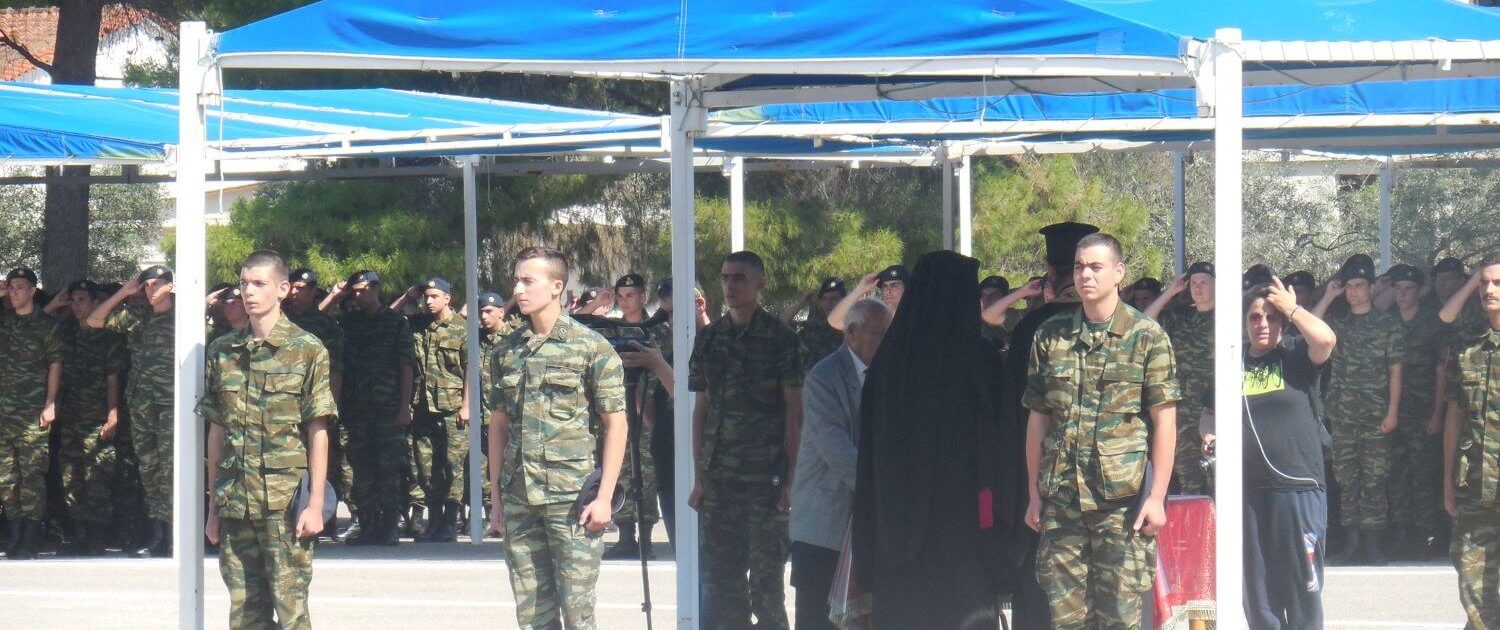
Socializing: the Greek way of life.
Much of Greek life is lived outside of the house. Socializing with friends is central to life in the community. For instance, going out for a coffee is a daily ritual for Greeks, both young and old. The younger generation enjoys coffee and pastries in the more modern cafés, while the older generation prefers the kafeneio — old traditional cafés which have existed for decades and continue to be the meeting point for elderly men. Kafeneios are in abundance throughout Greece, in every village and town, and while everyone is welcome and treated courteously, it remains a place mainly for men. They’re places where they spend their mornings chatting, reading the newspaper, playing cards or backgammon, discussing politics, and drinking raki (homemade brew).
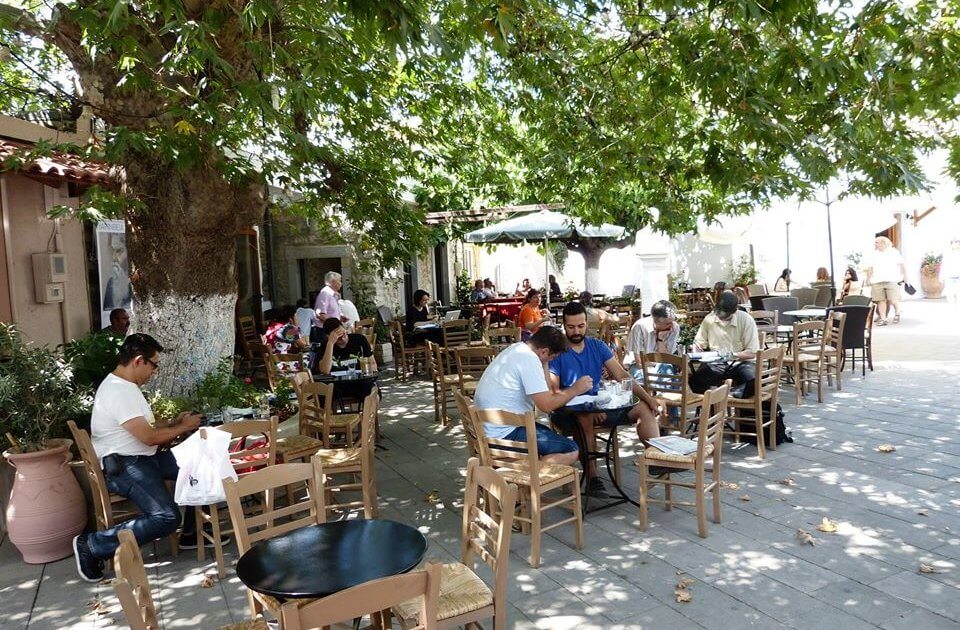
The Greek Welcome: the epitome of hospitality.
Unlike most Western cultures, you don’t need an invitation to drop in on a Greek friend or family member at their home. Greek homes are open 24/7 and offer the utmost hospitality. As soon as your feet enter the door, you’ll be invited to sit down and offered something to eat and drink, no matter the time. As a host, it’s expected that your visitors will invite their friends to join them at your house. Hospitality is highly prized. For this reason, every home has something hidden in the cupboard just waiting for that unexpected visitor. If you’ve been invited to dinner, make sure you go with an appetite. More likely than not, you’ll be offered at least four different courses, if not more!
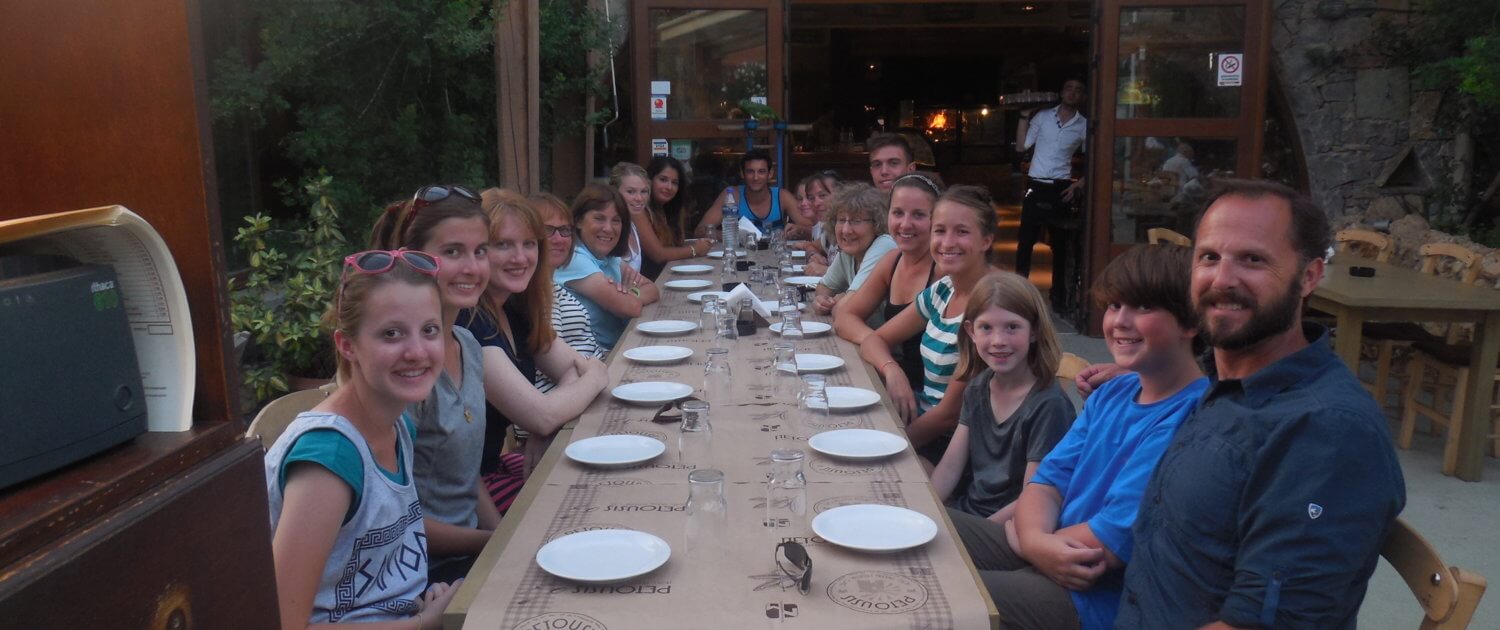
Easter in Greece: the most important holiday.
Easter for the Eastern Orthodox Church begins on Kathara Deftera (Clean Monday). This is the beginning of lent when many fast from meat for 40 days. Holy week begins with Palm Sunday and ends on Easter Sunday, observing Jesus’ last days on earth. There are evening church services throughout the week and certain days set aside for baking in preparation for the feast on Easter Sunday.
Megali Pembti (Great Thursday)
Megali Pembti is set aside for baking tsoureki (Greek sweet bread) and dyeing eggs red, symbolizing the blood of Christ.
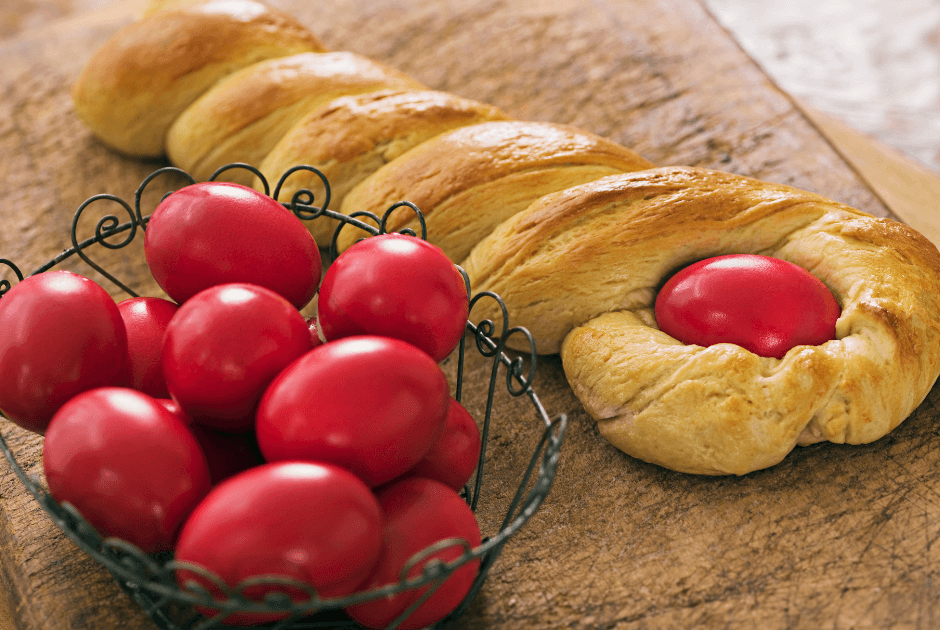
Megali Paraskevi (Great Friday)
Megali Paraskevi is the holiest day of the week and a day of mourning. Church bells ring out a mournful tone all day, flags fly at half-mast, and no one works or cooks on this day. Young women and children decorate Jesus’ epitaph with fresh flowers. At 9 pm, the epitaph parades around local communities in a procession accompanied by somber music.
Megalo Savato (Great Saturday)
On Megalo Savato, preparations are made for the resurrection of Christ at midnight and the feast for Easter Sunday. After receiving the “holy light” at midnight mass on Megalo Savato, families gather to break the fast of not eating meat. Margiritsa, a traditional Greek egg and lemon soup with lamb and lamb intestines, is served.
Kyriaki to Pasha (Easter Sunday)
Easter Sunday is a day celebrated with family and friends. Lamb on a spit begins roasting as early as 6 am and is served with roast veggies, Tzatziki (yogurt/garlic sauce), and a variety of salads. This vast banquet is accompanied by singing, dancing, and of course, plenty of Greek wine. OPA!
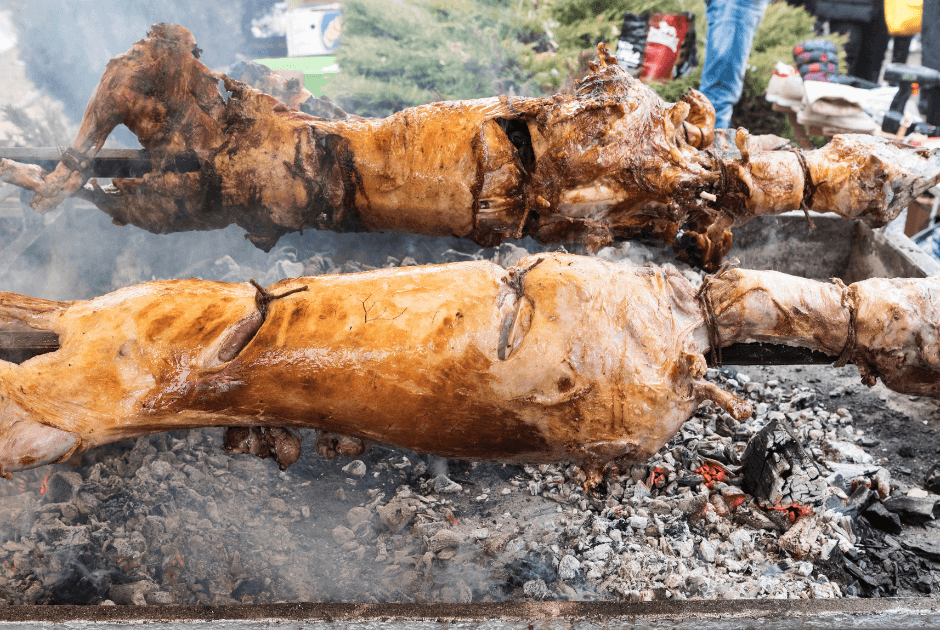

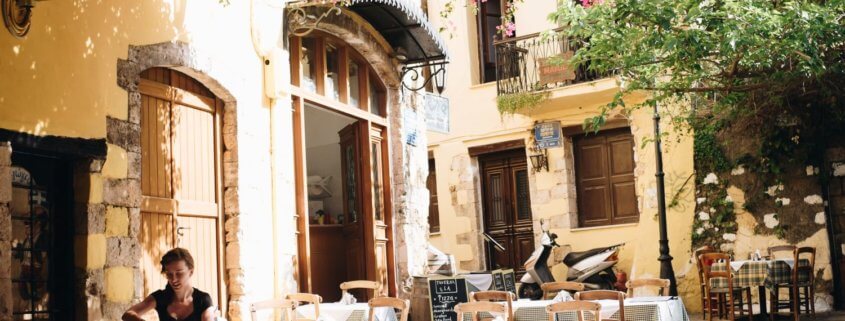


Leave a Reply
Want to join the discussion?Feel free to contribute!